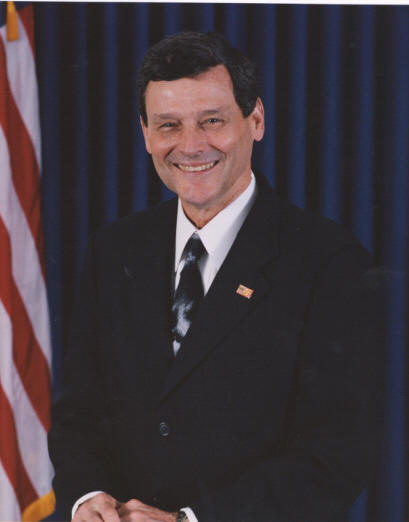Director of Homeland Security in New Orleans, Colonel Terry J. Ebbert.
On Thursday we had the opportunity go to the office of Homeland Security and talk to Colonel Terry Ebbert. As the director, he was responsible for coordinating emergency response for the Office of Emergency Preparedness, The Police Department and the Fire Department.
Ebbert started off by identifying the difference between commercial radio and operational radio. He said that operational communications is a system that works internally without ever being heard, seen, or used by the public. Radio communications, on the other hand, is a link to the public.
According to Ebbert, Katrina is an excellent example of how not to use commercial communications. When the Hurricane hit, the government had not come up with a concrete, well thought out process to deal with public communications at times of crisis. He said that it doesn’t make a difference if the government is communicating well with the media or not because somebody is going to say something. The show goes on. If you, as a public official, don’t supply the information, they will supply whatever story they can get. Now, one of the very difficult challenges of all United States public safety is to figure out how to involve commercial communications. New Orleans started with providing a station in each EOC because if anything, relationships have to be developed long before any emergency happens.
Besides having to address the most basic issues of operability, the government must still figure out how to build interoperability. As of right now, he said, there is no way to combine systems such as Motorola or Maycom. This proprietary aspect of commercial communications is one of the biggest problems for the government in creating interoperability. Companies are not going to build an all-encompassing communication tool because they want to sell their iPods, phones, and radios separately.
I tried asking the Colonel to recall any specific events of broadcast radio being helpful in their efforts. Like Sally Forman, Tom Levy, and Mike McKean, he mentioned that the radio was helpful, not in gathering information, but in providing it. He told me that if policemen were using the radio to figure out who needed help and where, it was done on an individual basis. It is interesting to note that while police cars have AM/FM radios and policemen can listen to broadcast news if they need to, fire trucks do not.
According to Ebbert, emergency preparedness is needed for more than weather. Hurricanes are, of course, a high priority but they also have to be ready for anything from marine hazards to terrorist threats. I think that statement truly helps in understanding the importance of strong, functioning and redundant communication systems. The inability to quickly and efficiently respond to the Katrina disaster in our own country, shed significant light on the dangers we, as a nation, are in if our communication systems are once again wiped out by a storm or foreign attack.
Craig, I enjoyed reading your interview with Ebbert. Let’s hope the lessons learned by the people who make the decisions in our federal agencies are not soon forgotten. Sometimes just the fact that people like you showed up at the door to ask these questions can make a significant difference in clarifying important issues.
By: Janna on January 21, 2008
at 4:57 pm